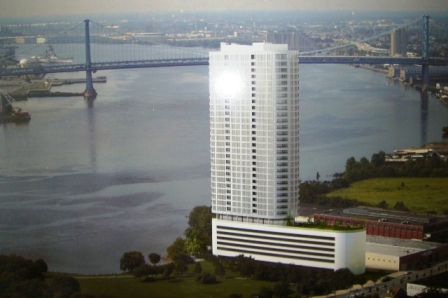Riparian rights for Trump, Penn Treaty Tower

Penn Treaty Tower
VTE Trump Tower
Feb. 22
By Kellie Patrick Gates
For PlanPhilly
With the governor’s signature Friday afternoon, two developers received the right to build condominium tower projects that will jut onto publicly owned land beneath the Delaware River.
House Bill 1621: Trump Tower
House Bill 1627: Penn Treaty Tower
But local state legislators are more excited about a little message contained in both laws – an assertion – directed especially at the State Supreme Court – that the only way any developer can get these riverbed rights is through the legislature.
The words are part of simultaneous, ongoing battles over casinos, future waterfront development, and local vs. state control.
SugarHouse Casino needs riparian rights to build the project it has planned for its Delaware Avenue site.
The way these rights have been granted for many years in Pennsylvania is through an act of the state legislature. And tradition held that only a legislator representing the district containing a proposed project would introduce the necessary legislation. None of the local legislative contingent was willing to introduce riparian rights legislation for either casino.
Foxwoods changed its plans, and now says it does not need them. Last year, SugarHouse attorneys found a 1907 law that they said gave the city’s Commerce Department the ability to grant riparian rights. Former Mayor John Street’s administration agreed, and the commerce department granted a license to SugarHouse.
Local legislators – including Reps. Michael O’Brien and William Keller and State Sen. Vince Fumo – filed a lawsuit in State Supreme Court, contending that the 1907 law was nullified by more recent state laws, including the Dam Safety and Encroachment Act, and that the city does not have the right to grant riparian rights.
Shortly after new Mayor Michael Nutter took office this year, he launched a review of all casino-related decisions made by Street’s team. He rescinded SugarHouse’s riparian rights license on the grounds that the process used to grant it was flawed. But Nutter still maintains that the city has the right to grant riparian licenses, and in a recent interview with PlanPhilly, he said he wanted all who want such a license to apply via the Commerce Department.
Nutter said SugarHouse could appeal and have another hearing before the Commerce Department. SugarHouse has not done so – they say the new administration cannot withdraw a license granted by its predecessor, and they have filed court briefs to that effect, in conjunction with the State Supreme Court case brought about by the local legislators.
In a statement, SugarHouse said the bills have no effect on the validity of the grant of riparian rights to the casino interest by the City of Philadelphia. But some of the legislators who filed the case said in a written statement released shortly after the Friday signing that it should now be extremely clear to the court just who has the right to grant permission to build on submerged lands.
“We believe the matter was clear from the beginning, but these two pieces of legislation eliminate any confusion, once and for all,” said Fumo.
Said Keller: “Passage of this legislation removes any and all clouds on this issue and makes it crystal clear that the Pennsylvania Legislature is the overriding authority when it comes to granting riparian rights.”
But the man who signed the bills into law says he isn’t sure whether or not the city can grant riparian rights. “The issue of whether local governments – in this instance, the City of Philadelphia – also have some authority to grant riparian rights along waterways abutting their boundaries is currently the subject of litigation pending before the Pennsylvania Supreme Court,” he wrote in a signing statement. “As a result, I think it is unwise for any of us to articulate a position regarding this subject. Consequently, my signature on these bills should not be viewed as my support for or against that position.”
Stephen Cozen, general council for SugarHouse, said in a written statement that his team has never said that the General Assembly does not have the authority to issue riparian rights, nor that the city has “inherent rights” to issue them.
But long ago, “the General Assembly delegated authority to the City of Philadelphia to issue submerged lands licenses, and that authority is still in effect today,” he said.
Mary Isaacson, O’Brien’s chief of staff, said that a brief outlining the portion of the law affirming the legislature’s right to grant riparian rights would be filed with the State Supreme Court on Monday.
With the riparian rights lease in hand, Trump Tower can soon begin construction, she said. Penn Treaty Tower’s developers still need more permits, she said.
The riparian rights granted Friday, which were first introduced in the state house by O’Brien, are the first granted since the governor called a moratorium on their issuance in April 2006.
The state had been issuing 99-year riparian rights leases for $1. But with casinos in the works, there was suddenly a lot more interest in development along the Delaware, and many felt the state should get more for the rights.
This past June, the Department of General Services recommended that developers pay a one-time fee of $5 per square foot of land for a 99-year lease, and that each lease include public access to the waterfront.
But the legislators added additional fees: In addition to $5 per square foot of riparian land, the developers will pay one dollar per square foot of their buildings.
Half of that money will accompany the $5-per-riparian-foot fee to state coffers. The other half will go to the city’s Commerce Department, to be used for the implementation of the Central Delaware Riverfront Plan put together after a year of public input.
Exactly how that money will be spent is uncertain, O’Brien said. He, Fumo and Keller will soon request a meeting with the Commerce Department to establish guidelines, he said.
“I think the significance of this is that we’ve broken a nearly two-year-old logjam on positive development along the Delaware River,” O’Brien said. “We’ve created green space, we’ve created access to the river, and we’ve created a funding source for an expansion of green space and access to the river beyond these specific sites.”
Neighborhood residents also get a say in what happens, O’Brien said, because Trump and Penn Treaty developers must reach community benefits agreements with neighborhood associations in order for the leases to stand. They have 18 months to do so.
Contact the reporter at kelliespatrick@gmail.com
WHYY is your source for fact-based, in-depth journalism and information. As a nonprofit organization, we rely on financial support from readers like you. Please give today.






